DECODING BUDGET 2023 FOR STARTUPS




The latest income tax rate of tax applicable on individuals for the financial year 2018-19 is given below:
A. Normal Rates of tax:
| S. No. | Total Income | Rate of Taxes |
| 1 | Upto Rs.2,50,000/- | Nil |
| 2 | Rs. 2,50,001/- to Rs. 5,00,000/- | 5% of the amount by which the total income exceeds Rs. 2,50,000/- |
| 3 | Rs. 5,00,001/- to 10,00,000/- | Rs. 12,500/- plus 20% of the amount by which the total income exceeds Rs. 5,00,000/-. |
| 4 | Above Rs. 10,00,000/- | Rs. 1,12,500/- plus 30% of the amount by which the total income exceeds Rs. 10,00,000/- |
Health and Education Cess: 4% of Income Tax
Surcharge: 10% of income tax, where total income exceeds Rs.50 lakh up to Rs.1 crore. Surcharge: 15% of income tax, where the total income exceeds Rs.1 crore.
B. Rates of tax for every individual, resident in India, who is of the age of sixty years or more but less than eighty years during the financial year:
| S. No. | Total Income | Rate of Taxes |
| 1 | Upto Rs. 3,00,000/- | Nil |
| 2 | Rs. 3,00,001/- to Rs. 5,00,000/- | 5% of the amount by which the total income exceeds Rs. 3,00,000/- |
| 3 | Rs. 5,00,001/- to 10,00,000/- | Rs. 10,000 /- plus 20% of the amount by which the total income exceeds Rs. 5,00,000/-. |
| 4 | Above Rs. 10,00,000/- | Rs. 1,10,000/- plus 30% of the amount by which the total income exceeds Rs. 10,00,000/- |
Health and Education Cess: 4% of Income Tax Surcharge: 10% of income tax, where total income exceeds Rs.50 lakh up to Rs.1 crore. Surcharge: 15% of income tax, where the total income exceeds Rs.1 crore.
C. In case of every individual being a resident in India, who is of the age of eighty years or more during the financial year:
| S. No. | Total Income | Rate of Taxes |
| 1 | Upto Rs. 5,00,000/- | Nil |
| 2 | Rs. 5,00,001/- to Rs. 10,00,000/- | 20% of the amount by which the total income exceeds Rs. 5,00,000/- |
| 3 | Above Rs. 10,00,000/- | Rs. 1,00,000/- plus 30% of the amount by which the total income exceeds Rs. 10,00,000/- |
Health and Education Cess: 4% of Income Tax
Surcharge: 10% of income tax, where total income exceeds Rs.50 lakh up to Rs.1 crore. Surcharge: 15% of income tax, where the total income exceeds Rs.1 crore. Rebate of Rs. 2500 for individuals having total income upto Rs 3.5 lakh [section 87a]
Income chargeable under the head Salary.
Income chargeable under the head House property. Income chargeable under the head Capital Gain. Income chargeable under the head Business and Profession. Income chargeable under the head Other Sources. Every individual is eligible for a deduction on the amount of income invested in specific securities, which will help the individual for computing the actual tax liability.
Section 80C
Section 80C provides deductions of savings in specified modes of Investments form gross total income. The Maximum permissible deduction is Rs.1.5 lakh along with deduction u/s 80CCC & 80CCD.The various investment avenues or expenses that can be claimed as tax deductions under section 80c are as below:
Section 80CCC
Contribution to annuity plan of Life Insurance Corporation of India or any other Life Insurance Company for receiving pension from the fund is considered for tax benefit. The maximum allowable Tax deduction under this section is Rs 1.5 Lakh
Section 80CCD
Employee can contribute to Government notified Pension Schemes (like National Pension Scheme – NPS). The contributions can be upto 10% of the salary (salaried individuals)&the self-employed (individual other than the salaried class) can contribute up to 20% of their gross income and the same can be deducted from the taxable income under Section 80CCD (1) of the Income Tax Act, 1961, as against current 10%. Total Deduction under section 80C, 80CCC and 80CCD (1) together cannot exceed Rs 1, 50,000.
Section 80 CCD (1b)
The government had introduced additional tax benefit for investment up to Rs 50,000 in NPS. If the taxpayer contributes more than Rs 1.5 lakh to the NPS in a year, the amount in excess of Rs 1.5 lakh can be claimed as a deduction under the new Section 80CCD(1b).
Section 80D
Deduction u/s 80D on health insurance premium is Rs 25,000. For Senior Citizens it is Rs 50,000.
| PARTICULARS | DEDUCTION LIMIT |
| Self,spouseandchildren | Rs. 25,000/- |
| Self, spouse and children plus parents | Rs.50,000/- (Rs. 25,000/- plus Rs. 25,000/-) |
| Self, spouse and children plus parents (Senior Citizens) | Rs.75,000/- (Rs. 25,000/- plus Rs. 50,000/-) |
| Self (Senior Citizens), spouse and children plus parents (Senior Citizens) | Rs. 1,00,000/-( Rs. 50,000/-plus Rs. 50,000/-) |
Section 80DD
Individual can claim maximum Rs 75,000 for spending on medical treatments of dependents who have disability. However, where such dependant is a person with severe disability, an amount Rs 1,25,000/-shall be allowed as deduction subject to the specified conditions. For claiming the deduction, assessee have to submit Form no 10-IA.
Section 80DDB
An individual (less than 60 years of age) can claim up to Rs 40,000 for the treatment of specified critical ailments. This can also be claimed on behalf of the dependents. The tax deduction limit under this section for Senior Citizens is Rs 1, 00,000. To claim Tax deductions, it is mandatory for an individual to obtain ‘Doctor Certificate’ or ‘Prescription’ from a specialist working in a Government or Private Hospital also called Form 10 I. For the purposes of section 80DDB, the following shall be the eligible diseases or ailments: Neurological Diseases where the disability level has been certified to be of 40% and above: Dementia Dystonia Musculorum Deformans Motor Neuron Disease Ataxia Chorea Hemiballismus Aphasia Parkinson’s Disease
Section 80E
If you take any loan for higher studies, tax deduction can be claimed for interest that you pay towards your Education Loan. This loan should have been taken for higher education for you, your spouse or your children or for a student for whom you are a legal guardian. There is no limit on the amount of interest you can claim as deduction under section 80E. The deduction is available for a maximum of 8 years or till the interest is paid, whichever is earlier.
Section 80EE
This was a new proposal which had been made in Budget 2016-17. First time Home Buyers can claim an additional tax deduction of up to Rs 50,000 on home loan interest payments. This deduction is over and above the Rs 2, 00,000 limit under section 24 of the income tax act. The below criteria has to be met for claiming tax deduction:
Section 80G
Contributions made to certain relief funds and charitable institutions can be claimed as a deduction under Section 80G of the Income Tax Act. The donations made to any Political party can be claimed under section 80GGC.w.e.f FY 2017-18, the limit of deduction under section 80G / 80GGC for donations made in cash is limited to Rs 2,000 only.
Section 80GG
This section is applicable on all individual whether salaried, self-employed or businessman. The maximum tax deduction amount is Rs. 60,000 per annum. This section is applicable for those individuals who do not have a residential house & do not receive House Rent Allowance from their employer. The extent of tax deduction will be limited to the least amount of the following;
Section 80TTA
This section provide a deduction of Rs. 10,000 on interest income. This deduction is allowed on interest earned –
· From a savings account with a bank
Section 80TTB
This section introduced from F.Y 2018-19.The deduction under this section is available only for senior citizen who are a resident of the India. Maximum deduction Rs.50,000/- is allowed on income earned from interest on bank saving deposits, fixed/recurring deposits, interest earned on deposit with co-operative society involved in banking and deposits in post office.
Section 80U
Under section 80U, in computing the total income of an individual, being a resident, who at any time during the previous year, is certified by the medical authority to be a person with disability, there shall be allowed a deduction of a sum of Rs 75,000/-. However, where such individual is a person with severe disability, a higher deduction of Rs 1,25,000/- shallbe allowable. Individual should note that 80DD deduction is in case of the dependent of the employee whereas 80U deduction is in case of the employee himself.